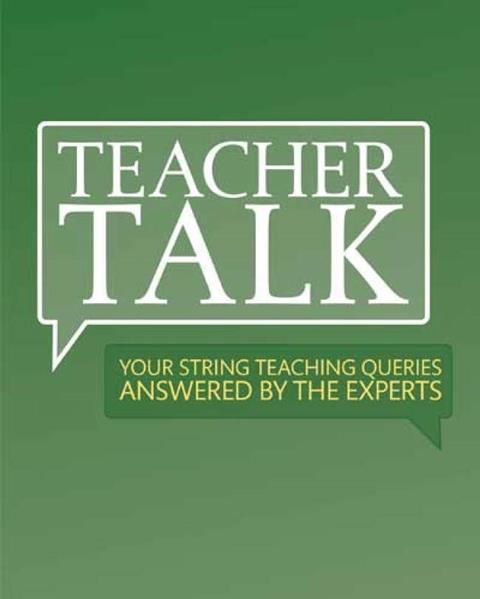Teacher Talk: your string teaching questions answered by our panel of experts

What do you do when parents of little beginners have no interest in the lessons or supporting the child’s learning at home? I really struggle with this at the private school where I teach. Do you have any practical tips for helping the child to practise on their own, and for dealing with uncommitted parents?
Jane Lews, Cambridge, UK
Géza Szilvay: Parents should be well informed about the special nature of learning the violin. One might hope that in the future, on the first page of every violin book written for beginners, a message would be given to the parents. It might contain sentences similar to the following:
Dear Parents,
Your child has just started the noble activity of violin playing. Please be aware that this is a special engagement, which needs your active participation and daily regularity. Learning to play an instrument – like having a precious plant or pet – demands day-to-day diligence. If you succeed in developing it into an everyday habit, your child will never feel it as a burden or a chore, but rather a lifelong, happiness-giving passion.
Similar greetings could be written on a label and pasted on small violin cases, and to this ‘tobacco warning’ a list of advantages can be added: ‘It is scientifically proven that active music making, in addition to musical skills, will improve concentration, memory, coordination, inner discipline, emotions and social abilities.’ This information will establish a basic relationship between child, family and teacher. Nevertheless it is not yet parental commitment.
Commitment will be achieved through regular involvement. This can be assisted if before the first violin lesson you advise the parents how to take care of the violin, how to change strings, how to fix a loose chin rest, how to tighten the bow, how to rosin the bow. After this introductory ‘lesson’ you can give regular courses where the parents learn music and even a basic knowledge of violin and bow hold. This will give them confidence and enable them to practise with their child at home.
Start to teach chamber music to the child shortly after the violin hold is established. Begin with duos, trios and quartets and enlarge it into string ensemble playing. The very first duos can be played by the child and parent, where the mother or father claps an easy rhythm and the child plays open strings. Parents’ enthusiasm will be increased when you invite them to attend ensemble rehearsals.
Give regular concerts in kindergartens to raise interest towards classical music and to recruit future pupils. Matinées, concerts, summer camps, domestic and international tours will create a way of life atmosphere for both children and parents. The team of committed families and teachers will serve as an example for others and your artistic—ped agogical work will influence and motivate the musical life of the whole country.
You probably smile at this long answer for your short question. This is a dream, you think. Such environment and circumstances exist nowhere. You are right. It doesn’t exist yet. But you can create it.
Bonnie Hampton: It is discouraging when parents do not support a young student’s discovery of an instrument and of music. If lessons are in connection with a school, it could help if practice could also be at school, with some supervision and encouragement. Having a ‘practice buddy’ can work if there is a suitable older student available. Within a teacher’s studio, it is helpful for there to be contact with other students and ensemble playing in the form of easy duets and trios.
It is a challenge to educate parents in the importance of their support. One can only try to get the ideas across, and try to make the argument that students who have music in their lives often have more interest in other school work, and that learning about music and an instrument is an involved process that teaches one how to learn on several levels.
THE EXPERTS:
Géza Szilvay is co-author of the Colourstrings teaching method and principal of the East Helsinki Music Institute
Bonnie Hampton is on the faculty at Juilliard School, teaching cello in both the college and pre-college divisions
Our Teacher Talk series was first published in The Strad in January 2011.Subscribe to The Strad and get the best in teaching tips every month, from Simon Fischer's long-running Basics column to advice from top string players in Masterclass. Or click here to find out about our digital edition.








































No comments yet